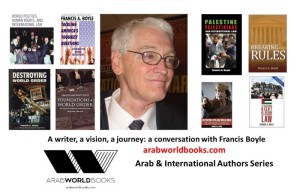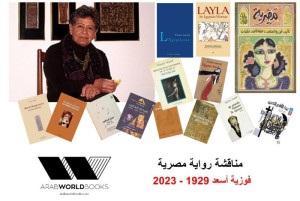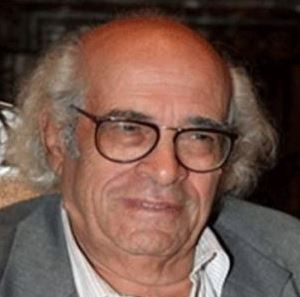Al-Hayat 2003/10/6
The word 'crisis' has become so widespread that it has lost its impact. There is no doubt that culture has its problems. There are aspects that herald a probable development, and warnings that suggest present dangers that almost hinder culture from carrying out its mission. I estimate that culture's crisis - if there is one - is not separate from that of society in general, in other words from the crisis of the radical treatment of social problems such as a traditional frailty of the educational systems, and the media's deceptiveness dedicated to concealing awareness and fostering negativity, the blunt entertainment and promotion for present regimes, and what results from that of spiritual and economic recession, and of unemployment in work and mind.
However, the issue is so large that I can only mention some of the points, perhaps I can see that the most important problems that the Arab national culture is facing in general are two aspects: the culture's relation to power on one hand and to legacy on the other hand. And with each aspect, there are many elements that perhaps I could point at in the course of these reflections.
About the first aspect, and so that we do not fall into generalizations and useless abstractions, an educated person that yields to power - no matter what power, whether it is political or social; a 'public opinion' power, in other words biases from people that were misled, or an ideological one, namely a power of ancestral established versions, religious ones or others that cannot be denied in what the prevailing claim applies- then the educated loses its role, its mission, as he also loses its credibility. Since the educated has to tower up the horizons, represent hope and the possibility of developing and change.
In my view, there is a possibility to conceive three orientations of power: the political and social power, the patrimonial power, and the ideological power.
The educated person in his relation to these three powers is opposed to them due to the nature of his role, which means that to what the 'limit of definition' could imply, he always aspires to the best, the straightest and the most beautiful.
So perhaps what clears out the educated person's relation to the political-social power, that he calls on, especially in our country, so that the political power would be really democratic and not only some repetitions to the slogans-lies, which means that the freedom to form different parties, organizations, syndicates and civil institutions, would be a complete freedom that is not restrained- then paralyzed and ineffective- by conditions imposed by the executive power- or to be clear by the police power. Also that the educated requests that the legislative elections would be free, honest and based on the direct individual election with mass preparation- or the necessary democratic political 'enlightenment' of the masses. And that the separation of the three powers, the executive, the legislative and the judiciary would be a real one based on the equal balance where no power prevails another one, and that the executive yields - as it should - to the legislature's supervision and accountability in addition to its ability to change the executive power to its highest levels if it sees it necessary to change it.
Provided that the liberal concept for power is based on what is generally agreed to define as the 'communist approach.' Once again, communism totally differs from the powers that stood upon the oppression of bureaucracy and the high-ranked groups of the party's organizations and their appropriation to direct society, the fact that fulfills- at the end- their interests only and not those of the popular masses. Those are the powers that prevailed and then collapsed in the Soviet Union and the countries adhered to its system.
Communism here is not a 'doctrine,' a fixed theory or an abidance by previous applications. Yet, it is an approach and a supple conception that is primarily based on two inseparable pillars: justice and freedom in their different levels, the individual and the social equally, and they are the wings of democracy.
So the educated person faces these powers in their different kinds with the aim to support more deeply and continuously the values of freedom, justice and the human dignity.
But as he performs this mission - or this calling - he cannot pretend that he has an absolute truth whether it was next to the fetid legacy in the metaphysical aspects or if it related to philosophies that depart from- or have alone- all the truth.
From a third aspect, what is it meant by the ideological power?
I think that what is incontestable is that ideology is present in the contents of every position, but the criterion here is freedom and the critical look and not that of the yielding, the obedience or the admission of defined and final sayings. It is usually said at the beginning of each treatment or handling any ideological problem that the standard is freedom, and that the issue refers to the method and that it is not an issue of sayings or sacred versions, but we find at the end the falseness of this pretense. We also find that the introduction contradicts with the handling and that the latter finds- at the end- its final reference not in the rationality or the critical look but in the texts and in some kind of the concealed sanctification of these texts, even if this latter- or the veneration or yielding to the source of reference- was undeclared or denied. Perhaps this is the problem in the relationship of the educated with the ideological power.
There is this question that urges me and it is about the presence of signs of cultural progress in Egypt and the Arab countries… while the course of talking reveals- up till now- the existence of a crisis in this culture… the legalized question here is where are then these signs amidst the intense problems of this culture?
Perhaps there are many standards for these situations, but let us consider the simplest of those standards, and that what can be called the development of the spiritual endowments of the individual and in consequence the stabilization or settlement of specific values, the most important are: freedom, dignity and justice. These values are abstract and generalized to an extent that they almost lost their meaning, but the essence is still present. I think that such values will remain with the person as long as he lives… these values result the social progress and the harmony of man with his environment, in other words with the nature, and that is the harmony that has- if I am allowed to this exaggeration- some poetry.
These different standards are the ones, which we rule with if there was any cultural progress or a serious crisis.
As for the signs- and strangely we can find them true not in the intellectual activity or the social one. The horizons in these domains seem glum or dark, but the in the artistic activity- in its wide meaning- whether in the plastic arts, the arts of saying or even in the refined music.
In this domain, we find that the accomplishments of the Arab culture in general invite us not to lose hope. Perhaps this had an important significance: there could not be some automatic or mechanic relation between the civilized operations (social-political-cultural). Also, there is no steadiness in developing or collapsing, or an automatic or inevitable connection, but there are ebbs and flows, and differences in the rise and fall. In consequence, the artistic field is the only one that can perhaps give- us- this hope, in opposition to the political domain (that has witnessed perhaps a progress in a previous period but it was beat). As for the intellectual or philosophical domain, it is still, in its majority, accordingly ill. The scientific domain has only transmission, skill and intense cleverness in applying, but the ability to innovate is absent or scarce.
The axis here in the culture's problem- or the society's problem- is the relationship between the ancestral and the secular movements.
Even inside of the ancestral movement there are many orientations: a completely self-closed orientation that refuses all kind of dialogue and clings to a delusional past, invented one, that puts absolute ideas or final judgments. It is a very dangerous movement and it seems at first blush that there is some dispute between it and the ancestral ones that are more enlightened and controversial. But the problem in this last orientation- the more enlightened and more contemporary- is that it sets in fact a trap to the receiver and the whole case… because no matter how much it claimed for itself of compliance to the demands of time or the ability to run a dialogue, it hands in fact the case over to the other secluded ancestral movement because it uses the same speech and refers to the same source of reference, and in consequence surrender itself to the stronger movement that draws more people and that is the secluded one. It is a movement that is able to beat, to rule, to embrace or to end this wing that claims for itself the right of enlightenment and conteporarity.
The hope is still set on the democratic movement or what I call the rational movement. This latter believes that the absolute truth is not a final possession for anyone, but it is always an object of a renewed question had the necessary social and controversial operation been ensured so that this movement get settled and become effective, or else we go back to the glum and obscure atmospheres.
Could the action of the ancestral movement in the cultural field be on the- exceeding- speculation level, or on that of the practice, pushing to the future's horizons, enriching culture in our country? In definition and specification, there is nothing in it that can enrich culture but it has- necessarily- what harms it and leads it to deterioration, but the main aspect is that this does not mean renouncing legacy, the 'ancestrals' do not have, on their differences, a special authorization over legacy. They might claim that they have the right identity for our culture and us, and that is not true. The aspect, which they focus on, is not a question of legacy, since the latter is not some specific practices that usually go back to the periods of the historical decline. We cannot forget the period of the live, innovative and fertile interaction between the Arab culture and the other ones during the period of rise of Islam. This controversial interaction was not perhaps repeated up till now. Those of the ancestral movement try to benefit from a fallacy or perhaps they try to pass one, and it is that related to the fact that the whole 'legacy' means 'ancestrality,' in the meaning of the impossible return to the past.
How can we see the dispute inside of the harmonized unity desired by all the cultural movements, as long as I see the ancestral movement depressed for the hopes and present, yet the future of the national culture?
We must agree that the ancestral movements are a standing fact in society, but I guess that they are not an enriching element.
Perhaps one of the most important problems of the rational democratic movement was that it did not run a serious dialogue with reality, and in consequence having an increasing tendency to seclusion, and separating from reality. It is important to me here that I am not inviting for the unity of the cultural movements but I am pointing out at the integration between the desired reality or between what is present and what is requested. That is what I mean in the dispute, and also that none of the movements- no matter what was its legitimacy and credibility- becomes the only one, because this ends up by deforming it specifically… since the controversy is a basic law of the those of life itself. This is what I mean in harmony, that which is standing on the opposition and contrast.
The rational liberal movement's mission specifically is to reach the necessary extent of freedom and the critical look without which there won't be any active culture, and in consequence, every absolute idea would be the object of questions… the absolute ideas are now numerous whether in what is related to metaphysics, politics or race, in all these contexts of the absolute, there should be critical look or there would be something final, precisely in the rational meaning.
There is another question in this context: is there any relationship between the absent social role of the national educated and the movement of the social dispute?
Yes, there is a basic relationship but it is not- as I already mentioned- an automatic or inevitable constant one. There is a large margin or a wide opportunity for adventure and freedom. Inside of this margin lies the responsibility because if we admit the eternity of this relationship and its mechanism, this would mean an invitation (even if it was concealed) to totally refrain from working and admit some social mechanism, as if it were a metaphysical mechanism. This is the field of the primary differentiation in this relationship and in the domain of the initiative or the adventure inside of the social dispute's movement and next to it.
Our Culture And Its Relation With Power And Legacy
By: Edward Kharrat - on: Sunday 1 October 2006 - Genre: Social Sciences
Upcoming Events

Joseph Conrad's Heart of Darkness Discussion
April 27, 2024
Join us for a special discussion of Joseph Conrad&...

A writer, a vision, a journey: a conversation with Francis Boyle
February 24, 2024
This event took place on 24 February 2024 Yo...

Discussion of Fawzia Assaad’s An Egyptian Woman
November 25, 2023
In celebration of the life and outstanding achieve...

Toni Morrison's The Bluest Eye, A Presentation and Discussion
October 28, 2023
This presentation and discussion of Toni Morrison&...
